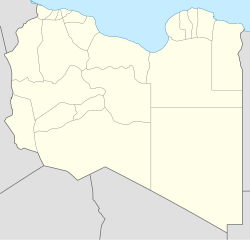Zuara
|
Zuwara زوارة |
||
|---|---|---|
| City | ||
 |
||
|
||
| Location in Libya | ||
| Coordinates: 32°56′N 12°05′E / 32.933°N 12.083°ECoordinates: 32°56′N 12°05′E / 32.933°N 12.083°E | ||
| Country |
|
|
| Region | Tripolitania | |
| Elevation | 0 ft (0 m) | |
| Population (2013) | ||
| • Total | 350,000 | |
| Time zone | EET (UTC+2) | |
Zuwarah, or Zuwara (/zʊˈwɑːrə/) (Arabic: زوارة), is a port city in northwestern Libya, with a population of around 350,000 (2013), famous for its beaches and seafood. It is situated 102 km (63 mi) west of Tripoli and 60 km (37 mi) from the Tunisian border. It is the capital of the Nuqat al Khams district. Its population speaks Zuwara Berber, a Zenati Berber language.
The settlement was first mentioned by the traveller al-Tidjani in the years 1306-1309 as Zwara al-saghirah ("Little Zwarah"). In a Catalan sailing manual (1375) it was called as Punta dar Zoyara. The town is mentioned by Leo Africanus in the 16th century. It later served as the western outpost of Italian Libya (1912–43), being the terminus of the now-defunct Italian Libya Railway from Tripoli 105 kilometres (65 mi) to the east. Its artificial harbour shelters a motorized fishing fleet. Cereals, dates, and esparto grass (used to make cordage, shoes, and paper) are local products.
In 1973, it was here in Zuwara that Muammar Gaddafi first proclaimed the Libyan "Cultural Revolution".
In the 2011 Libyan Civil War battles, the city was reported by Al Jazeera to be under control of the local anti-Gaddafi forces on 23 February 2011, and lost by the government of Muammar Gaddafi. Thousands of anti-government protesters, gathered in the Zuwara town square on 24 February, repulsed another Libyan Army attempt to retake the city. Loyalist forces used the pro-government towns of Jumayl and Riqdalin to the south as bases for their attacks on the city. However, from March onwards, the city was under the control of loyalist forces. Amidst the August rebel coastal offensive, rebels took Zuwara on 18 August.
...
Wikipedia


